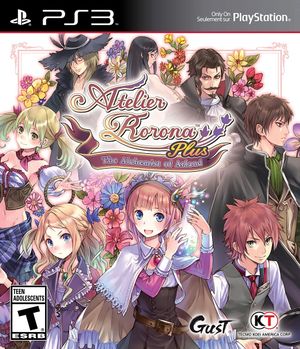No edit summary |
m (Text replacement - "==Configuration==↵<!-- Enter mandatory non-default settings to be used. Recommendatory or default settings can be entered only on exceptional basis. -->{{config↵<!-- CPU configuration -->↵|ppu decoder = <!-- Interpreter (static), Interpreter (dynamic), Recompiler (LLVM) -->↵|ppu decoder notes = ↵|spu decoder = <!-- Interpreter (static), Interpreter (dynamic), Recompiler (A...) |
||
| Line 59: | Line 59: | ||
|resolution scale threshold = <!-- Value between 1 to 1024 in the format 16 x 16 --> | |resolution scale threshold = <!-- Value between 1 to 1024 in the format 16 x 16 --> | ||
|resolution scale threshold notes = | |resolution scale threshold notes = | ||
|output scaling = <!-- Nearest, Bilinear, FidelityFX Super Resolution --> | |||
|output scaling notes = | |||
|shader mode = <!-- Legacy (singlethreaded), Async (multithreaded), Async with Shader Interpreter, Shader Interpreter only --> | |shader mode = <!-- Legacy (singlethreaded), Async (multithreaded), Async with Shader Interpreter, Shader Interpreter only --> | ||
|shader mode notes = | |shader mode notes = | ||
| Line 141: | Line 143: | ||
|read color buffers = <!-- On, Off --> | |read color buffers = <!-- On, Off --> | ||
|read color buffers notes = | |read color buffers notes = | ||
|handle rsx memory tiling = <!-- On, Off --> | |||
|handle rsx memory tiling notes = | |||
|disable on-disk shader cache = <!-- On, Off --> | |disable on-disk shader cache = <!-- On, Off --> | ||
|disable on-disk shader cache notes = | |disable on-disk shader cache notes = | ||
|disable vertex cache = <!-- On, Off --> | |disable vertex cache = <!-- On, Off --> | ||
|disable vertex cache notes = | |disable vertex cache notes = | ||
|allow host gpu labels = <!-- On, Off --> | |||
|allow host gpu labels notes = | |||
|rsx fifo accuracy = <!-- Fast, Atomic, Ordered & Atomic --> | |rsx fifo accuracy = <!-- Fast, Atomic, Ordered & Atomic --> | ||
|rsx fifo accuracy notes = | |rsx fifo accuracy notes = | ||
Latest revision as of 13:49, 3 March 2024
| Atelier Rorona: The Alchemist of Arland | |
|---|---|

| |
| Developer(s) | Gust Co. Ltd. |
| Publisher(s) | JP Gust Co. Ltd. NA/EU/AU Nippon Ichi Software |
| Series | Atelier |
| Release date(s) | Atelier Rorona JP June 25, 2009 NA September 28, 2010 EU October 22, 2010 AU October 28, 2010 Atelier Rorona Plus JP November 21, 2013 AU June 19, 2014 NA June 24, 2014 EU July 2, 2014 |
| Release type | Multi-platform |
| Genre(s) | Role-playing |
| Mode(s) | Single-player |
| GameID(s) | Atelier Rorona BLES01030 (IRD), BLUS30465 (IRD), BLJM55018 (IRD), BLJM60154 (IRD) Atelier Rorona Plus BLES02050 (IRD), BLJM61127 (IRD), BLUS31449 (IRD), NPEB02047, NPUB31522, NPJB00509 |
| Quick links | Check Compatibility Open Issues Search Google Wikipedia Page |
Atelier Rorona: The Alchemist of Arland (Japanese: ロロナのアトリエ ~アーランドの錬金術師~ Hepburn: Rorona no Atorie ~Aarando no Renkinjutsushi~) is the eleventh installment in the Atelier series, and it continues the series' emphasis on item synthesis. The game is the first title in the series to be developed for PlayStation 3, and it is also the first to utilize 3D models as opposed to the 2D sprites in earlier titles. A sequel titled Atelier Totori: The Adventurer of Arland, which takes place five years after the end of Atelier Rorona, was released in Japan on June 24, 2010.
Gust released a remake of Atelier Rorona titled Atelier Rorona Plus: The Alchemist of Arland (Japanese: 新・ロロナのアトリエ はじまりの物語 ~アーランドの錬金術士~ Hepburn: Shin・Rorona no Atelier Hajimari no Monogatari ~Arland no Renkinjutsushi~) for PlayStation 3 and PlayStation Vita. In Australia, it received a rating of "R18+" for "Sexual Violence".
Atelier Rorona has four main modes of gameplay: a field map, a battle screen, an alchemy system, and a visual novel system. Navigation occurs via two static map illustrations, which depicts the Arland town and its surrounding area in a scaled down view. Field map areas such as the town and forests are depicted as realistically rendered environments, in which the player can converse with locals, gather items, or encounter enemies. Enemies on field maps are openly visible to the players, and players can either engage or avoid the encounter. Contact with the enemies initiates a separate battle screen.
Configuration
No options that deviate from RPCS3's default settings are recommended for this title.
Known Issues
There are no reported issues with this title.